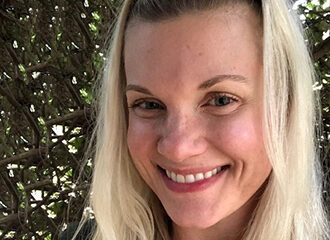Written by: Erin Wentroble, PsyD (she/her/hers)
Site Director at The Renfrew Center of Pittsburgh
If you are navigating treatment or recovery from an eating disorder, you may start to feel some stress or anxiety as Thanksgiving approaches, a season marked by food-centered events and invitations to spend lots of time with family, friends, and colleagues. Here are 3 tips to help you manage.
In our diet and appearance obsessed culture, holiday-related events can often center around weight talk, good- versus- bad- food talk, the latest diet trends, open commentary on people’s food choices and even a focus on our bodies. In addition, for many indigenous people in recovery, Thanksgiving is a day of remembrance and mourning that can evoke intense feelings such as grief and sorrow. In this post, we share some tools that can help you feel more prepared and supported as the holiday approaches while you’re actively navigating your recovery.
3 Tips to Help You Navigate the Holidays
Tip #1—Identify a support person
If you decide to attend a gathering or a dinner, it can be extremely helpful to consider the folks that will be there and identify one person you can turn to for support. This person does not necessarily have to know everything about you or your treatment journey but maybe it’s someone who could recognize with a knowing glance that you may need some support.
Think through ahead of time about what kind of support may be helpful in these situations. Support during these times can take so many forms including: changing the direction of a diet or body centered conversation, simply validating your emotional experience (e.g., “I can see this situation is tough and I’m here for you.”), reminding you to breathe, giving your hand a squeeze at the dinner table, or recognizing when it may be time to step away and encouraging you to take a moment to yourself.
It is helpful to have a conversation with your support person in advance, let them know you may be looking to them for support, and share explicitly the type of support you find helpful. If you do not celebrate Thanksgiving, consider surrounding yourself with trusted friends, family or allies that can support you on this day.
Eating disorder thoughts grow in secrecy, so finding support and keeping the lines of communication open is key to navigating the challenges during this time of year.
Tip #2 – It is OK to Say No Sometimes
For many folks, Thanksgiving kicks off a busy holiday season. The demands for your time and attention are high, stress levels heighten, and there is increased pressure to be everywhere for everything. It is so important to know your limits, be able to assess what you need, and say ‘No’ to events that challenge your boundaries or are misaligned with your values.
You do not have to attend that ‘Friendsgiving’ if you are feeling burnt out and need to re-charge. You do not have to go Black Friday shopping with your mom if you feel like your day could be better spent saving money and practicing some self-care. Everyone knows that adage “You can’t pour from an empty cup” and it is so important to remember during this time.
The best way to be present for yourself and your loved ones at the events that matter to you is to make sure you approach those events re-charged- with a “full cup”. Saying no to our friends and family is often easier said than done, so it can be important to remind ourselves that setting boundaries with them keeps us from feeling resentment and helps us to be able to love them more fully because of that.
This is a time to priortize what brings you joy. Try intentionally giving yourself permission to say “no” to the events that don’t fit within your boundaries and your values during this time.
Tip #3 – Allow Yourself Permission to Feel All of Your Emotions
Practicing gratitude is a hallmark activity for mood boosting and generally encouraged for mental health and wellness. It also happens to be a staple activity around the Thanksgiving holiday. However, depending on your history and where you are in your treatment and recovery journey, practicing gratitude can feel nearly impossible.
If you are finding it difficult to identify the things you are grateful for, try to allow yourself to feel and validate whatever emotions arise. It may be that this time of year is especially hard for you because it is associated with intergenerational trauma or other painful experiences in the past. It is okay if you just make it through the day without being able to live in gratitude and express that freely.
If you feel compelled to engage in a gratitude activity, you could try a more non-traditional, specific approach to thankfulness. For example, instead of trying to list all-encompassing things like “my health” or “my family”, find small moments in your day that you want to take a moment and appreciate (e.g., the sounds of your nieces and nephews giggling in the next room, the cozy sweater you chose to wear, the feeling of your pet snuggled up against you).
It is these small moments that make recovery so worth it and taking the time to intentionally appreciate them may help you stay focused on making choices that align with your recovery.
Conclusion
With these tips, we hope that you can find meaning that transcends beyond the meal and helps you reclaim the day for yourself. Remember how far you have come on your journey, remember all the skills you have picked up along the way, use your supports, practice good boundaries, and remind yourself that you can and have done hard things!




